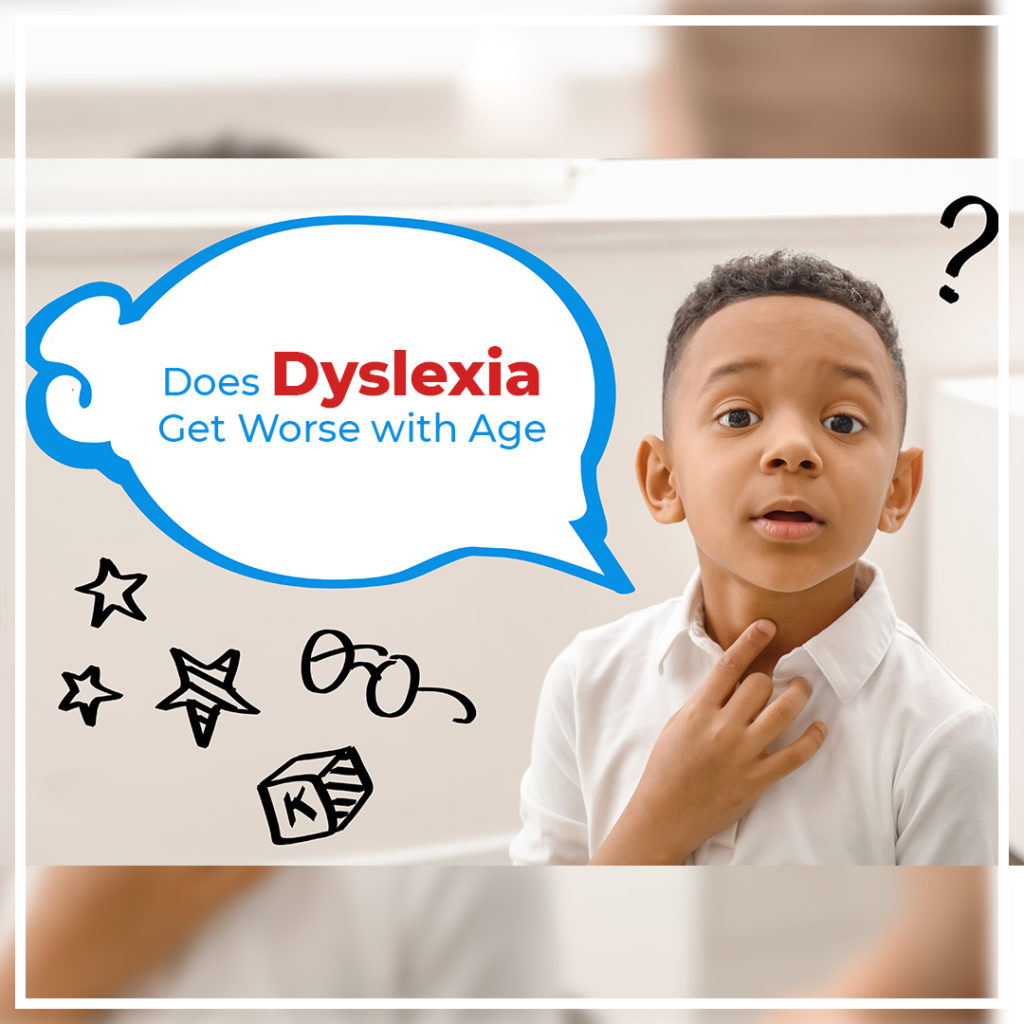It’s sad that, even though both parents and kids try to determine “what’s wrong,” they frequently blame themselves for no fault of theirs.
When a kid struggles with dyslexia-related learning issues, parents frequently worry about whether the condition will get worse or if it will outgrow its current state.
Despite the fact that dyslexia has nothing to do with a child’s ability or desire to learn, children do not outgrow dyslexia.

Neglecting the issue could lead to lifelong reading, spelling, and writing impairments.
In this blog, we will discuss the effects of untreated dyslexia on children and also the question“does dyslexia get worse with age?”The section examines how specialized learning facilities can help dyslexic children overcome learning challenges and keep the disorder from affecting them as adults.
Initial challenges
Dyslexia affects everyone differently, but it presents difficulties with language-based learning for kids because they have issues deciphering words.
For instance, by exerting more effort than necessary in their early years of school, some children with undiagnosed dyslexia may surpass their peers.
As children get older, there is more pressure on them to read and write fluently. Without the proper support, students with learning disabilities are likely to fall behind academically. This is evident from the fact that these students’ reading comprehension is still below grade level and that they find writing to be difficult and time-consuming.
Once they begin to associate learning with difficulty, children with learning disorders may lose interest in their studies. There are widespread misunderstandings regarding dyslexia, including the notions that it is a result of laziness or that a child’s learning challenges would pass.
Challenges persist
Yet dyslexia typically lasts until adulthood.
Others with dyslexia are not diagnosed until they are adults, while some people with the condition find that their symptoms change as they age.
How does dyslexia change as we age? The signs of dyslexia do not go away with age, despite the fact that they do tend to change. With the correct support and supervision, dyslexics can succeed in both their academic and professional lives. Continue reading to learn more about the potential effects of dyslexia on people of different ages.
Under stress, could it get worse? Simply put, stress during pregnancy and the early years of childhood may increase one’s likelihood of acquiring dyslexia, and dyslexia itself may be the product of an evolutionary-preserved adaptive response to stress. Nonetheless, it has long been known that early adversity might cause reading difficulties.
Would dyslexia worsen if it wasn’t treated? If dyslexia is not treated, it can result in low self-esteem, behavioral problems, anxiety, anger, and alienation from friends, parents, and teachers. Being unable to read and understand as a child gets older could prevent them from reaching their full potential.
Correlation between dyslexia and age: Does dyslexia get worse with age?
Theory 1: Aging doesn’t really make dyslexia worse
Dyslexia symptoms do not ‘become worse’ with age. But the longer children go without help, the harder it is for them to overcome their learning obstacles. This is mostly due to the fact that a child’s brain plasticity decreases with age.
This affects children’s ability to adapt to change. For children with dyslexia, it takes four times as long to intervene in Primary 4 as it does in late kindergarten.
Together with a decrease in brain plasticity, rising academic expectations cause children to feel more stress. For instance, by the third grade, children with undiagnosed dyslexia know 10,000 fewer words than their peers. According to this The Strait Times article, kids who feel like they are lagging behind their peers may struggle with social and emotional problems, including anxiety.
Regrettably, not just students are impacted by these problems. Young people with undiagnosed dyslexia can have a disadvantage when they begin college or their jobs. Dyslexia has lasting effects and affects performance in a range of contexts, even though it doesn’t get worse with age.
Dyslexia cannot be addressed since it is a brain trait, a cognitive style with strengths and limitations. Many people with dyslexia are able to overcome their challenges with reading and spelling and succeed in their professional lives when they choose careers that play to their strengths, such as filmmaking (Steven Spielberg), social cognition (Gavin Newsom), writing (Philip Shultz), architecture, surgery, etc.
Despite the fact that they are literate and literate, persons with learning problems frequently dislike reading and are nevertheless likely to have some deficiencies in written language skills, such as a slow reading pace. Like any other physiologic characteristic, the cognitive and neural phenotype of dyslexics is likely to have an effect on aging.
Theory 2: Ageing makes us Dyslexic
Important studies published in the journal Aphasiology confirmed what was already clinically and logically understood: growing older causes us to become a little bit “dyslexic.”
Yet how? According to this review, it is because growing older impairs higher brain function. This is consistent, to a limited extent, with slower speech and discourse handling, memory and fixation lapses, and so on. And also because older adults were discovered to have similar phonetic processing issues to younger children with learning challenges, who were predicted to have a serious cerebral impairment.
In any instance, an equally important related discovery was disregarded from consideration. Similarly, growing older makes us clumsy. Might moderate clumsiness and dyslexia be related? Might the fundamental nature of this interaction also explain the proverb “Sound body, sound brain”?
According to Dr. Harold Levinson, solving nearly all of the problems illustrating dyslexia required an understanding of this lately forgotten link. Also, the rational understanding of “Sound body, sound psyche” led to the discovery of a novel and effective clinical therapy for dyslexics of all ages. It also clarified the cerebellum’s dual role in determining how the brain’s higher-order cognitive functions—such as judgment and learning, memory, focus, speech and language, emotions, and physical (like phonetic) handling—are carried out. By mistakenly attributing these latter talents to simply cerebral cortex processors earlier, dyslexic presumptions, convictions, and classifications were formed.
Over a multi-decade research effort, a comprehensive understanding of dyslexia and all of its variations, including maturing, emerged. It was believed that dyslexia was unquestionably more complex than just a major reading problem caused by inversions or phonetic difficulties. In fact, this learning problem was seen as a complex condition with reading and non-reading side effects that affected writing, spelling, math, memory, conversation, tactile engine handling, and other areas.
Just balance and coordination, or “klutzy” neurological symptoms and side effects indicative of an internal ear/cerebellar shortcoming, were consistently discovered during point-by-point clinical tests of dyslexics. In a similar vein: Could reading and phonological difficulties, along with the majority of other dyslexic side effects, result from a “klutzy” or cerebellar origin as opposed to the expected cerebral one? Given that many dyslexics (non-seniors) have excellent visualization, may the cerebral cortex initially be typical in them? Since that symptomatic cerebral neurological indications couldn’t be identified, may the cerebral cortex in this way perform a key compensating role as opposed to a dysfunctional one?
In view of the above discoveries and experiences,Levinson proposed the dyslexia condition to happen when initial typical perusingand related higher mind cerebral designs neglected to make up for or process the inward/cerebellar ear decided mixed perusingand related signals got and communicated.
Importantly, this concept was also foreseen through the investigation of outstanding inner ear specialists (neurotologists) and cerebellar neurophysiologists, thereby obtaining their assistance. Given that the cerebellum regulates signal transmissions, as demonstrated by Nobel laureate Sir John Eccles, signal scrambling results from cerebellar disappointment. In addition, many other researchers, like Alan and Henrietta Leinert and Robert Dow, highlighted the cerebellum’s important role in coordinating higher mental functioning with the cerebral cortex. In this approach, a cerebellar defect can explain psychological, fixation, and severe dysfunction as well as the “klutziness” associated with dyslexia and related learning, consideration deficit, and, surprisingly, phobic issues.
Careful neuropsychological testing revealed that most dyslexic children do not grow up to be dyslexic and vice versa. Growing older appears to reduce cerebral and related cerebellar activity, which helps to explain both dyslexia and clumsy development.
Final word: Stop dyslexia from persisting throughout adulthood
If you have any suspicions, think considering having your child’s disease properly diagnosed.
Many educational institutions offer the expertise and experience required to help students overcome their learning challenges. In addition to dyslexia examinations, these centers use instructional methods and resources tailored specifically for dyslexia that are not offered in conventional schools. Although dyslexia is a challenge for many children, specialized learning environments can provide your child with the support they need to get over their challenges and grow into a self-assured and competent young adult.
Our vision at I Empower, LLC is for every parent, educator, and student to be aware of the signs of dyslexia and the appropriate interventions and modifications that can be made to enable individuals who are affected lead lives where they feel confident and empowered. Visit www.iempowerllc.com to learn the lookouts for dyslexia.
